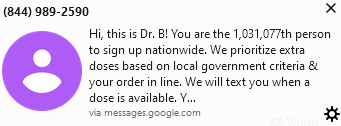Needle phobia, dust in the wind, surprising Alzheimer’s treatment, and more
11 Mar 2021
Posted by Andrew Kantor
The best-laid plans
On the one hand, “Biden will announce he intends to secure another 100 million doses of Johnson & Johnson’s vaccine.”
On the other hand, “J&J manufacturing delays hit US vaccine rollout”.
CBD vs Alzheimer’s
Immunologists at the Dental College of Georgia, working with other researchers, found that high doses of CDB seems to help patients with Alzheimer’s — it restores the TREM2 and IL-33 proteins, which are key to cleaning up the disease’s trademark beta-amyloid plaque.
They found CBD appears to normalize levels of IL-33, a protein whose highest expression in humans is normally in the brain, where it helps sound the alarm that there is an invader like the beta-amyloid accumulation.
These tests were done on mice in the late stages of the disease; next steps “include determining optimal doses and giving CBD earlier in the disease process.”
So it’s only South Africa that’s a problem
The Pfizer/BioNTech Covid-19 vaccine works against both the UK and Brazilian variants (in the lab, at least), meaning it’s only the South African variant that might — emphasis on might — evade the vaccine to some extent.
The pollen-virus connection
We all know grandma was wrong when she said that being cold made you sick. There are a lot of reasons sickness seems to spread in the cold: more time indoors, less vitamin D, even less UV radiation to kill germs.
It’s a multi-variable situation, making patterns hard to predict.
So let’s add another: pollen. Could pollen help disease spread? Why yes, yes it could. German researchers figured out the “could” part — the question is just how much an impact it might have.
[P]ollen could be a culprit in respiratory infections, not because the viruses hitch a ride on pollen grains and travel into our mouth, eyes, and nose, but because pollen seems to perturb our immune defenses, even if a person isn’t allergic to it.
“When we inhale pollen, they end up on our nasal mucosa and here, they diminish the expression of genes that are important for the defense against airborne viruses.”
BUT… Dutch researchers struck back, pointing out that “the arrival of pollen season in the Netherlands coincides with the end of flu season.”
Meaning — you know the drill: More research is needed.
Coke doesn’t add life
If you have patients with breast cancer, here’s a surprising bit of news: Epidemiologists at the University at Buffalo have found that drinking sugar-sweetened soda (i.e., not diet) is particularly dangerous for them.
Compared to women who never or rarely drank non-diet soda, those who reported drinking non-diet soda five times or more per week had a 62% higher likelihood of dying from any causes, and were 85% more likely to die from breast cancer specifically.
Why soda specifically? Per the researchers, “Non-diet sodas are the highest contributors of sugar and extra calories to the diet, but they do not bring anything else that is nutritionally beneficial.”
Sharing leftovers
Dr. B (as reported in the New York Times) is a website that will match patients who want a Covid-19 vaccine with providers who have extra that will go to waste.
Answer some basic questions for eligibility (medical conditions, age, etc.) and you’ll get a text if and when there’s a vaccine near you. If you can make it in two hours, reserve your spot. The signup process takes about 90 seconds. (Yours truly probably has a bit of a wait, but who knows?)
And if you have extra vaccines on hand, sign up as well so you can give them out!

I think I’m in for a wait.
Welcome to the future
Eli Lilly’s Olumiant, which treats rheumatoid arthritis, might work against Alzheimer’s. Why do Harvard/MIT researchers think so? Because an artificial intelligence algorithm suggested it.
The machine-learning system, called DRIAD (Drug Repurposing In Alzheimer’s Disease), reviewed information about 80 FDA-approved drugs and the mRNA expression profiles from human brains, and it determined that JAK inhibitors (like Olumiant) just might work.
Next up: “Clinical investigation.”
Pins and needles, but mostly needles
Pro tip: If someone is already afraid of needles, showing them dozens and dozens of pictures and videos of people getting vaccines … well, that’s not going to make them more comfortable.
More than causing squeamish people to look away or change the channel, researchers say such illustrations could hamper efforts to get a broad swath of U.S. residents vaccinated.

Don’t even go there.


